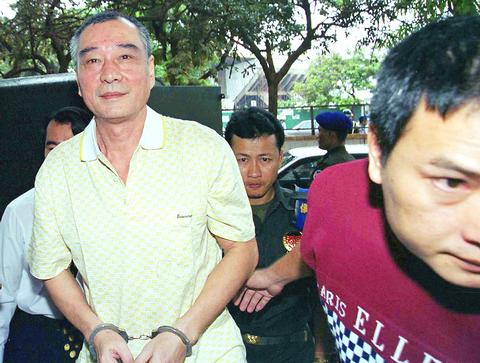A Cambodian court released yesterday the reputed leader of the infamous "Bamboo Union" (
Chen Chi-li (陳啟禮), 58, thought to be the spiritual leader of the Bamboo Union's 10,000 members worldwide, and Taiwanese national Lia Ming-in, 28, were convicted of possession of illegal weapons and sentenced to three years in prison.

PHOTO: REUTERS
The court released the two defendants after citing the one year they had already spent in Phnom Penh's National Military Police Headquarters since a raid on Chen's home in July last year.
The judge suspended the other two years of his sentence, dismissed charges of involvement in organized crime and using North Korean diplomatic license plates.
"He used illegal weapons because of fear for his own security," said Judge Yia Sakorn, who presided over the trial. "The three were not involved with organized crime."
Quong Ouquing, 45, from China, who was also charged in the case, was sentenced to just over one year in prison but was released after completing his sentence.
"The defendant has sacrificed his own money for the public interest, such as the renovation of public places in the city and helping the poor," Judge Yia Sakorn said. "This point the court opted to take into consideration."
Chen smiled after the verdict was announced and signaled to reporters with a nod of his head that he was satisfied with the verdict and would stay in Cambodia.
"This is the first just verdict in Cambodia," said Som Chan Dyna, one of the defense lawyers in the case. "Chen Chi-li will continue to stay in Cambodia and continue to promote Chinese and foreign investment in Cambodia."
Observers said that the suspected gang leader's prominence in government and business circles may have influenced the court's decision. Chen has received the prestigious title "Okhna" bestowed on prominent businessmen who benefit the community and is confirmed to have been an advisor to Senate President Chea Sim.
"Chinese investors and a request made by the Chinese Investment Association in Cambodia said that as long as one of their most important men was still in prison, the number of Chinese investors and investment capital will drop," Som Chan Dyna said.
Chen is wanted on criminal charges in Taiwan, but the two countries have no diplomatic relations or an extradition treaty.
A Taiwanese court in 1985 convicted the suspected gang leader of murder in the 1984 slaying of dissident writer Henry Liu (
He was sentenced to life in prison, but released after six years and fled to Cambodia in 1997 to avoid a crackdown in Taiwan on organized crime.
Chen and the two other men were arrested last year in a raid on his Phnom Penh home. According to the police report, a large cache of automatic weapons, including AK-47s and a grenade launcher, were found at the home. Police also seized US$4,000 in cash and two vehicles.
Since fleeing Taiwan in 1997, Chen has lived freely in Cambodia with the apparent blessing of high-ranking government officials.

The CIA has a message for Chinese government officials worried about their place in Chinese President Xi Jinping’s (習近平) government: Come work with us. The agency released two Mandarin-language videos on social media on Thursday inviting disgruntled officials to contact the CIA. The recruitment videos posted on YouTube and X racked up more than 5 million views combined in their first day. The outreach comes as CIA Director John Ratcliffe has vowed to boost the agency’s use of intelligence from human sources and its focus on China, which has recently targeted US officials with its own espionage operations. The videos are “aimed at

STEADFAST FRIEND: The bills encourage increased Taiwan-US engagement and address China’s distortion of UN Resolution 2758 to isolate Taiwan internationally The Presidential Office yesterday thanked the US House of Representatives for unanimously passing two Taiwan-related bills highlighting its solid support for Taiwan’s democracy and global participation, and for deepening bilateral relations. One of the bills, the Taiwan Assurance Implementation Act, requires the US Department of State to periodically review its guidelines for engagement with Taiwan, and report to the US Congress on the guidelines and plans to lift self-imposed limitations on US-Taiwan engagement. The other bill is the Taiwan International Solidarity Act, which clarifies that UN Resolution 2758 does not address the issue of the representation of Taiwan or its people in

DEFENDING DEMOCRACY: Taiwan shares the same values as those that fought in WWII, and nations must unite to halt the expansion of a new authoritarian bloc, Lai said The government yesterday held a commemoration ceremony for Victory in Europe (V-E) Day, joining the rest of the world for the first time to mark the anniversary of the end of World War II in Europe. Taiwan honoring V-E Day signifies “our growing connections with the international community,” President William Lai (賴清德) said at a reception in Taipei on the 80th anniversary of V-E Day. One of the major lessons of World War II is that “authoritarianism and aggression lead only to slaughter, tragedy and greater inequality,” Lai said. Even more importantly, the war also taught people that “those who cherish peace cannot

US Indo-Pacific Commander Admiral Samuel Paparo on Friday expressed concern over the rate at which China is diversifying its military exercises, the Financial Times (FT) reported on Saturday. “The rates of change on the depth and breadth of their exercises is the one non-linear effect that I’ve seen in the last year that wakes me up at night or keeps me up at night,” Paparo was quoted by FT as saying while attending the annual Sedona Forum at the McCain Institute in Arizona. Paparo also expressed concern over the speed with which China was expanding its military. While the US